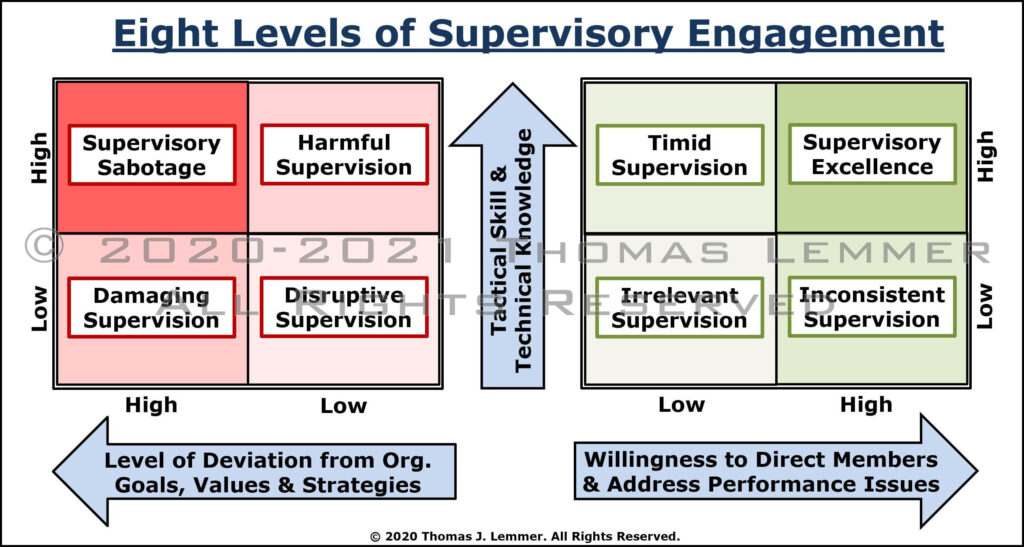By Thomas Lemmer. Published in the Summer 2022 issue of the Command Magazine by the Illinois Association of Chiefs of Police.
This article provides an introduction to the Eight Levels of Supervisory Engagement Model developed by Thomas Lemmer. As a law enforcement leader, Lemmer has served in several challenging settings. He has two decades of experience directing, managing, and assessing other law enforcement supervisors and executives. As deputy chief, he led the Chicago Police Department’s management accountability processes, and authored the department’s formal CompStat directive.
Click here to open in desktop full screen or your mobile PDF viewer.
Lemmer provides an effective management perspective drawn from his formal studies, research abilities, university-level teaching and in-service police trainer experiences, operational insights, and supervisory expertise. From this background, he created the “Eight Levels of Supervisory Engagement.” This leadership model has been accepted by the Illinois Law Enforcement Training and Standards Board (ILETSB). Lemmer continues to present the model in seminars hosted by ILETSB’s Executive Institute.
The Key Variables
The model focuses on three key variables. First, the level of technical knowledge and tactical skill. Second, the willingness of a supervisor to direct subordinates and proactively address performance issues. Third, the level to which the supervisor has come deviate from the organization’s values, goals, and strategies. Through the three-factor matrix, eight engagement levels have been identified. They extend from the ideal, “supervisory excellence,” down to the lowest and most concerning level, “supervisory sabotage.”

Lemmer advises that just as what police officers do matters: “What we do as police supervisors and executives matters as well.” To this end, the model also provides 19 separate leadership response strategies. These approaches can be used to foster an environment of supervisory excellence within a law enforcement agency.
Advanced by the ILACP
The article was published as a companion summary to the executive training Lemmer conducted for the members of the Illinois Association of Chiefs of Police (ILACP) at their annual conference held in April 2022. As noted in the article, Lemmer’s April conference presentation came immediately following a presentation on the partnership efforts of the ILACP and the National Association for the Advancement of Colored People (NAACP). Together the ILACP and NAACP identified Ten Shared Principles focused on public safety and policing. In concluding the article Lemmer advised: “As police agencies continue to move forward, building and maintaining supervisory excellence will be key to both their successful implementation of these principles and their overall ability to enhance public safety.”
Get this Training
This 80-minute conference session presentation was recorded by the ILACP. The session continues to be available to ILACP members in collaboration with the ILETSB. Learn more about the ILACP’s online learning network here.
Learn about this insightful model, and how to bring supervisory engagement training directly to your agency, by going to the model’s training overview page. Half-day and comprehensive full-day seminar options are available.
Your Thoughts
What are you thoughts on the importance of supervisory in policing? Leave a comment below regarding this article and topic.
We are interested in your thoughts, and invite you to comment below.


